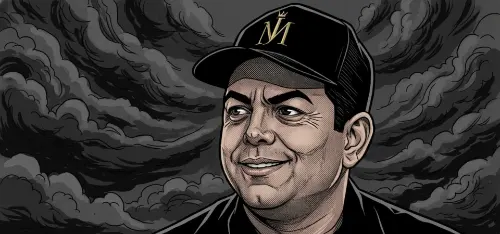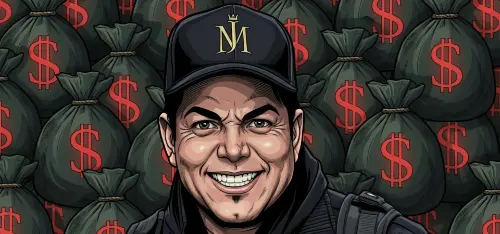Taj Jackson Uses Own Abuse Claims to Attack Wade Robson’s Credibility

March 21, 2020
In May 2013, soon after Wade Robson publicly revealed he had been sexually abused by Michael Jackson as a child, Taj Jackson—Michael Jackson’s nephew—posted on Twitter that he too had been abused as a child by an uncle on his mother’s side. While this might have seemed like an act of solidarity, Taj’s intent appeared more focused on discrediting Wade’s account than contributing meaningfully to the wider conversation about abuse. His tweets were defensive and emotionally charged, raising serious concerns about his motivations and grasp of the complexities surrounding child sexual abuse.
Taj’s tweets included statements like:
- I won't let anyone tarnish my Uncle's legacy. #Followthetrail
- Don't forget I was living at Neverland when Wade testified during my uncle's case. I sat there and ate dinner with him and his family.
- My hands are still trembling.
- That is how I KNOW Wade is lying. Because I AM a survivor.
- My uncle was a support system for me and my mom. He wrote a letter to her that many have seen already, u just didn't know what it was about.
- I was sexually abuse. By an uncle on my mom's side of the family when I was a kid.
These comments reveal a troubling contradiction. Taj identifies as a survivor of child sexual abuse, yet uses that status to dismiss another survivor’s account. Claiming “I KNOW Wade is lying. Because I AM a survivor” is not only illogical—it’s damaging. Being a survivor doesn’t give someone the authority to judge the truth of others’ experiences. This kind of rhetoric perpetuates the stigma and disbelief that survivors often face. Taj’s stance comes across as self-important and misguided, implying that his own experience somehow qualifies him to invalidate others, which harms the wider survivor community.
Taj has chosen not to share details of his own abuse. He hasn’t named his abuser or said whether it was reported. While he’s entitled to privacy, the timing and context of his disclosure—immediately after Wade’s—raises doubts about its sincerity. Was it a genuine moment of vulnerability, or a calculated move to undermine Wade’s credibility? Without further explanation or follow-up, Taj’s story risks seeming like a rhetorical tactic rather than a heartfelt contribution to the discussion on abuse.
Taj also referenced a letter Michael Jackson wrote to his mother, suggesting it proved Jackson’s innocence. This is a flawed argument. Abusers often go to great lengths to appear kind and trustworthy, especially to those close to them. Rolf Harris, the Australian entertainer convicted of child abuse, made educational videos warning against abuse while committing those very crimes. Presenting oneself as a protector is a known method of grooming and manipulation. Taj’s reliance on a personal letter as proof of innocence shows a lack of understanding of how abusers operate and how they often hide behind gestures of care and support.
Many abusers deliberately embed themselves in families and communities to build trust. One documented case involved an abuser who acted warmly towards a woman’s children and even suggested installing a lock on the bathroom door to appear concerned about boundaries. These behaviours aren’t signs of innocence—they’re calculated moves to avoid suspicion and gain access.
Below is an example:
A number of abusers even use the issue of child sexual abuse to integrate themselves into families to show that they can be trusted. One abuser described, "I was being super gentle and friendly with her kids. I was making her feel safe that I was with her kids. There was an incident in the bathroom, for example. While I was in the bathroom, many times the kids tried to come in. I said to her, "You should have a lock on the bathroom."
It’s also important to note that respected advocates and organisations in the field of sexual abuse have voiced support for Wade Robson and James Safechuck. Figures like Tarana Burke, founder of the #MeToo movement, actor and survivor Anthony Edwards, and Jan Broberg, who has spoken publicly about her own abuse, have all expressed belief in Wade and James. Organisations such as RAINN, 1in6, Safe Horizon, MaleSurvivor, and It’s On Us have also shown support. These individuals and groups have deep experience in abuse cases, and their endorsements carry weight. Taj Jackson, by contrast, has no professional background in this area and hasn’t shown a nuanced understanding of the psychological and emotional complexities involved.
Taj’s main concern seems to be protecting his uncle’s legacy. While it’s understandable to want to defend a family member, his approach has focused more on reputation than on the realities of abuse. His tweets are reactive and lack the thoughtful reflection expected from someone who claims to be a survivor. Rather than using his platform to support survivors or raise awareness, Taj has aimed to discredit others and shield his uncle from scrutiny.
There’s also a clear double standard in how Taj’s supporters treat his claims compared to those of Michael Jackson’s accusers. Taj’s story is accepted without question—no one asks for evidence or corroboration. Yet Wade and James face intense scrutiny, with every detail of their accounts examined. This imbalance is not only unfair but reflects a wider cultural issue: the tendency to believe those defending powerful figures while doubting those who challenge them.
If Taj is truly a survivor, he could use his experience to support others, raise awareness, and help prevent abuse. Instead of attacking fellow survivors, he could stand with them in advocating for change. His current stance, however, suggests he’s more focused on defending a legacy than on helping others heal.
In conclusion, Taj Jackson’s response to Wade Robson’s disclosure was not only inappropriate but harmful. Using his own alleged abuse to discredit another survivor is deeply troubling. His lack of openness, reliance on emotional rhetoric, and failure to engage with the complexities of abuse undermine his credibility. If Taj genuinely wants to support survivors and contribute to the conversation, he needs to move beyond defensiveness and start listening, learning, and responding with empathy and humility.
With permission, the following article was translated and enhanced from The Truth about Michael Jackson.


